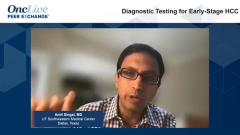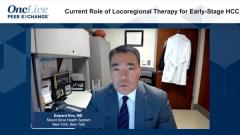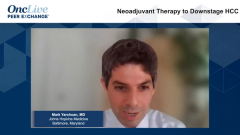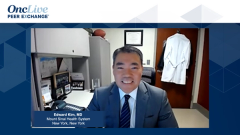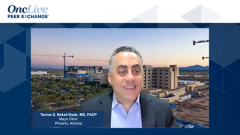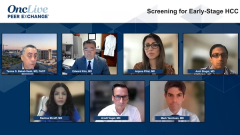
Systemic Treatment Advances for Advanced HCC
Exciting developments using novel therapies as systemic treatment for advanced hepatocellular carcinoma.
Episodes in this series

Tanios S. Bekaii-Saab, MD, FACP: Moving forward, we are seeing some exciting developments in systemic therapy despite some early disappointments with single-agent immunotherapy. It seems like we’re moving the field forward. Mark, what say you?
Mark Yarchoan, MD: Sorafenib has been our standard of care for about a decade. But just last year, the exciting development was that the FDA approved the combination of bevacizumab and atezolizumab, the first therapy to essentially replace sorafenib as, I would say, the default standard of care in the frontline setting. This is based on the IMbrave150 study that many people are aware of now, that randomized patients to atezolizumab plus bevacizumab vs sorafenib with the coprimary end points being PFS [progression-free survival] and OS [overall survival]. This is a clearly positive study. Patients who were randomized to atezolizumab plus bevacizumab had longer OS, longer PFS, higher response rate. Not only that, but they actually had a better quality of life, the time to deterioration of their quality of life was better on the atezolizumab plus bevacizumab arm. This is a clearly positive study, and for patients with advanced-stage disease, you really need a reason not to use atezolizumab plus bevacizumab in the front line.
That being said, there are reasons not to use atezolizumab plus bevacizumab in the front line. The major issues are, No. 1, bleeding. Bleeding has always been a concern with bevacizumab. When the IMbrave150 study was conducted, all patients received endoscopies prior to starting therapy and had to have control of their varices. Despite that, there was more bleeding with bevacizumab than there was on the sorafenib arm in the study. For patients who have a particularly high risk of bleeding, and patients with recent bleeds, this is probably not the regimen that should be used. Because of the immunotherapy component of the regimen, patients with an active, severe autoimmune disease, should not get these. Patients who have received transplants, shouldn’t get this. And in my practice, there’s also a group of patients who really need concurrent locoregional therapy where the long half-life of the bevacizumab can be problematic. These are again small groups of patients, but if you add them all up, it ends up being a larger group of patients who probably should not receive bevacizumab and atezolizumab. Data show that about 40% of patients make antidrug antibodies [ADAs] against the atezolizumab component of the regimen, but it’s hard to know what to do with these data. There’s not really a clinical assay for it, and at the end of the day, the study is positive even with that feature.
Tanios S. Bekaii-Saab, MD, FACP: There’s a difference between the antibody count overall and the neutralizing antibody, which I have not seen that anywhere with atezolizumab plus bevacizumab. I was intrigued, and perhaps you can give your thoughts about this. When I looked at that clinical cancer research paper that summarized, not just with HCC [hepatocellular carcinoma] but with a lot of other diseases, it looked like those who actually produced more antibodies, not talking about the neutralizing but the total antibody count, ended up with a little bit better outcome in a couple of diseases, or not too much of an adverse outcome. I can’t make sense out of those data. Do you or others have any other thoughts?
Mark Yarchoan, MD: In the FDA label, there’s an analysis of patients in HCC who made these antibodies, and there was a suggestion that maybe they didn’t derive as much benefit from atezolizumab plus bevacizumab. But this is a retrospective, subgroup analysis, and we all know that these things often don’t amount to much, so it’s hypothesis-generating. The reason that it’s interesting for patients who progress on atezolizumab plus bevacizumab, it raises the question whether some of them may functionally be more PD-1 naïve. And so, is there a role for a subsequent checkpoint in these patients, recognizing that some of them may have made ADAs? It’s an academic discussion right now but something that we’ll continue to discuss in the future.
Tanios S. Bekaii-Saab, MD, FACP: Arndt?
Arndt Vogel, MD: I completely agree. At the moment, the picture is not so clear about atezolizumab plus bevacizumab, and it’s also that they’re fluctuating. Sometimes they come and go, so it’s difficult to tease out how it completely affects the outcome. As indicated before when you think about them beyond progression, and the studies that look at this, for this it might be more in the upfront treatment.I agree, it’s interesting but difficult to really say what it means for the clinic.
Tanios S. Bekaii-Saab, MD, FACP: Rachna, I want to go to you with your thoughts. I hear Mark about the risk of bleeding, and I agree. But all the agents we use, even the TKIs [tyrosine kinase inhibitors], have VEGF activity, and specifically lenvatinib is a relatively potent VEGF inhibitor. Any thoughts about how this applies to our oral agents as well?
Rachna Shroff, MD: That’s such an interesting question because now with the use of atezolizumab plus bevacizumab, just as they did in the study, I make sure that they’ve had a recent endoscopy, I try to make sure that they’re not at risk for bleeding. It is absolutely the exact question that I asked myself, “How come I never did that when I was using lenvatinib?” Hopefully, these patients are being co-managed with hepatology and are getting the regular kind of close monitoring that they should be having anyway. Unfortunately, that’s not always the case, and I will be frank when I say that if there’s a reason that I can’t give atezolizumab plus bevacizumab, I continue to use the VEGF TKIs without the need to always make sure that they’ve had a recent endoscopy. I agree with you, Tony, there’s absolutely a risk, and I try to do my best to make sure that we are not at risk for bleeding by having an endoscopy, but it’s not the same thing. I don’t necessarily hold the start of therapy. I do agree, Mark, that I think bevacizumab, just from our experience with it over all GI [gastrointestinal] malignancies, once you’ve had a bevacizumab-related bleed, you’re scarred for life. You remember that, and these HCCs are very different than our patients with colorectal cancer and such. We have a much lower threshold with bevacizumab than we do with the oral TKIs.
Transcript Edited for Clarity


